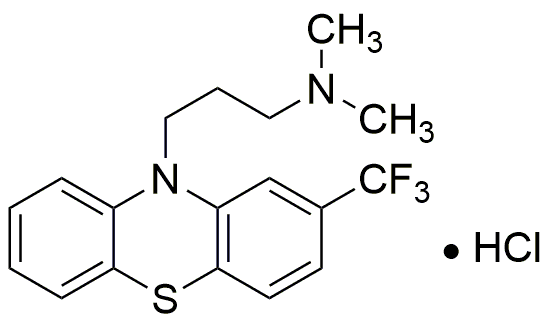Triflupromazine hydrochloride is widely utilized in research focused on:
- Psychiatric Medicine: This compound is primarily used as an antipsychotic medication, helping to manage symptoms of schizophrenia and other mental health disorders, providing relief to patients and improving their quality of life.
- Veterinary Medicine: It is also applied in veterinary settings to treat behavioral issues in animals, such as anxiety and aggression, ensuring better management of pets' mental health.
- Research on Neurotransmitter Activity: Researchers use it to study the effects of neurotransmitters in the brain, offering insights into various neurological conditions and potential new treatments.
- Pharmaceutical Development: The compound serves as a model in the development of new antipsychotic drugs, allowing scientists to explore modifications that could enhance efficacy or reduce side effects.
- Clinical Trials: Triflupromazine hydrochloride is often included in clinical trials to evaluate its effectiveness and safety, contributing to the advancement of mental health therapies.
General Information
Properties
Safety and Regulations
Applications
Triflupromazine hydrochloride is widely utilized in research focused on:
- Psychiatric Medicine: This compound is primarily used as an antipsychotic medication, helping to manage symptoms of schizophrenia and other mental health disorders, providing relief to patients and improving their quality of life.
- Veterinary Medicine: It is also applied in veterinary settings to treat behavioral issues in animals, such as anxiety and aggression, ensuring better management of pets' mental health.
- Research on Neurotransmitter Activity: Researchers use it to study the effects of neurotransmitters in the brain, offering insights into various neurological conditions and potential new treatments.
- Pharmaceutical Development: The compound serves as a model in the development of new antipsychotic drugs, allowing scientists to explore modifications that could enhance efficacy or reduce side effects.
- Clinical Trials: Triflupromazine hydrochloride is often included in clinical trials to evaluate its effectiveness and safety, contributing to the advancement of mental health therapies.
Documents
Safety Data Sheets (SDS)
The SDS provides comprehensive safety information on handling, storage, and disposal of the product.
Product Specification (PS)
The PS provides a comprehensive breakdown of the product’s properties, including chemical composition, physical state, purity, and storage requirements. It also details acceptable quality ranges and the product's intended applications.
Certificates of Analysis (COA)
Search for Certificates of Analysis (COA) by entering the products Lot Number. Lot and Batch Numbers can be found on a product’s label following the words ‘Lot’ or ‘Batch’.
*Catalog Number
*Lot Number
Certificates Of Origin (COO)
This COO confirms the country where the product was manufactured, and also details the materials and components used in it and whether it is derived from natural, synthetic, or other specific sources. This certificate may be required for customs, trade, and regulatory compliance.
*Catalog Number
*Lot Number
Safety Data Sheets (SDS)
The SDS provides comprehensive safety information on handling, storage, and disposal of the product.
DownloadProduct Specification (PS)
The PS provides a comprehensive breakdown of the product’s properties, including chemical composition, physical state, purity, and storage requirements. It also details acceptable quality ranges and the product's intended applications.
DownloadCertificates of Analysis (COA)
Search for Certificates of Analysis (COA) by entering the products Lot Number. Lot and Batch Numbers can be found on a product’s label following the words ‘Lot’ or ‘Batch’.
*Catalog Number
*Lot Number
Certificates Of Origin (COO)
This COO confirms the country where the product was manufactured, and also details the materials and components used in it and whether it is derived from natural, synthetic, or other specific sources. This certificate may be required for customs, trade, and regulatory compliance.


